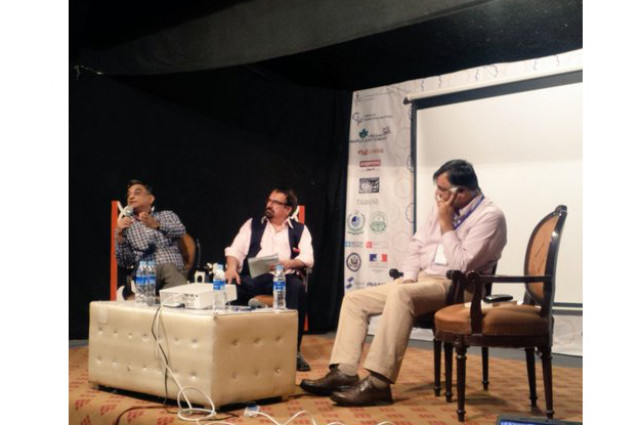‘In private life, Jahangir was more like Akbar’
Parvez Qureshi, an architect and urban planner, talked about the history of Sikhism in the area

Prof Najaf Haider, Tahir Kamran & Parvez Qureshi speaking at a session titled Rescuing the Past. PHOTO: TWITTER
“If the mainstream reading of Pakistan’s history teaches that the origins of the country date back to 711 AD, a huge part of its heritage is lost in this discourse,” said Najaf Haider, a professor of history from Jawaharlal Nehru University, on Saturday.
He was addressing a session at Afkar-i-Taza conference titled Rescuing the Past. The discussion centred on Pakistan’s history and relationship with its pre-Islamic past.
Haider spoke about civilisations that had existed in the subcontinent before 711AD. He also discussed some techniques historians could use.
Haider said textual evidence was an important source. “There is a lot of Persian text on the history of the subcontinent. A large number of court documents and letters were written in shikasta (calligraphy style). The skill to decipher these manuscripts is disappearing,” he said.
He said it was important to train new researchers to decipher the language. He said there was also a need to make these manuscripts accessible.
Haider stressed the importance of translations by giving the example of a book recently discovered in Lahore which contained a record of Jahangir’s private court sessions at night. He said the discovery of new material to study the Mughal era was rare. “The book, titled Majalis-i-Jahangiri, offers a fascinating insight into Jahangir’s mind. This was very different from the way he presented himself in Jahangirnama.”
He said this was because Jahangirnama was meant to be a public document. “This was not meant to be public... Coming from a traditional Muslim family, I was shocked to hear some of the issues he discussed,” he said. Haider shared some questions about Islam and Quran that Jahangir had been asking religious scholars among his advisers. Haider said these did not fit in with the orthodox impression Jahangir had been associated with. “He was very much his father’s son in his way of thinking,” he said. Parvez Qureshi, an architect and urban planner, talked about the history of Sikhism in the area. He outlined the importance of religious sites in the Punjab. Qureshi stressed the need to improve conservation.
Published in The Express Tribune, April 3rd, 2016.



















COMMENTS
Comments are moderated and generally will be posted if they are on-topic and not abusive.
For more information, please see our Comments FAQ